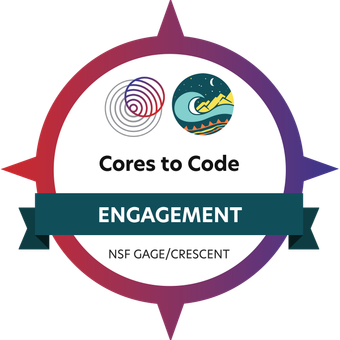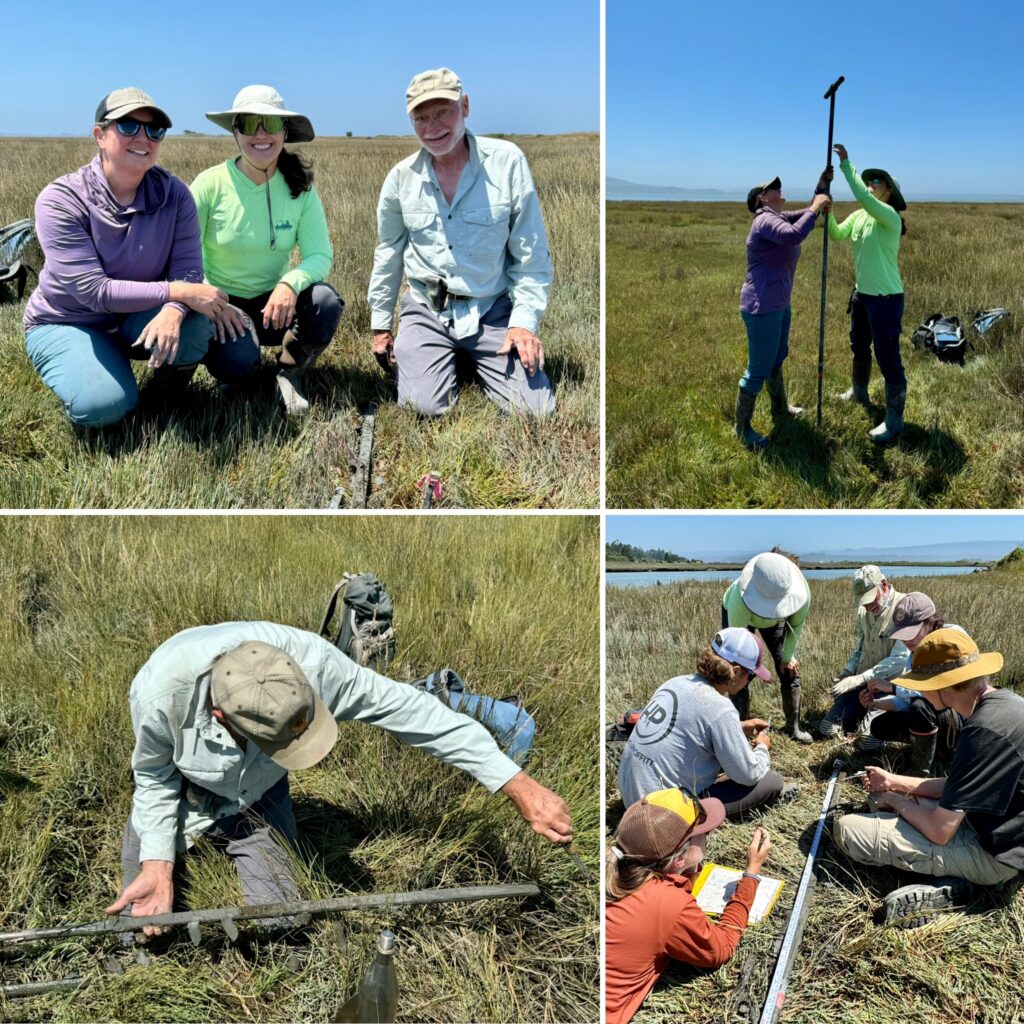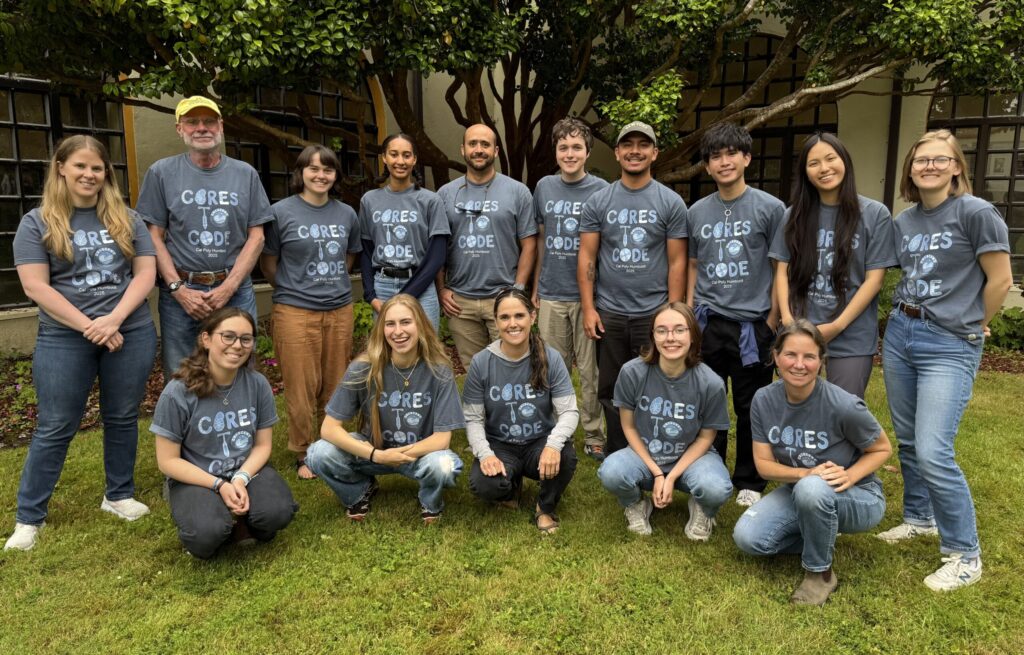
Geoscience Education and Inclusion
CORES TO CODE
About
Program Overview

Cores to Code (C2C) is a 3-week summer undergraduate research experience that dives into the interdisciplinary study of the earthquake and tsunami history of the Cascadia subduction zone. The program is based out of Cal Poly Humboldt, a minority-serving institution. Students conduct geologic fieldwork in Humboldt Bay coastal marshes, collect marsh sediment cores, conduct laboratory analysis on the cores, and explore how these geologic data are integrated into the geophysical models that help characterize past earthquakes along the Cascadia subduction zone. At the end of the program, students synthesize and present their findings to their peers and instructors.
Program Highlights
💸 Get Paid to Learn: Dive into a paid summer program with a stipend of $2000, funded travel to and from Cal Poly Humboldt, and funds for field equipment– because your passion should pay off!
🏡 Home Sweet Housing: Enjoy free meals and shared housing during the program. Students will be staying in shared dorms at Cal Poly Humboldt in Arcata, California
![]() Course Credit: Students who want course credit for C2C are encouraged to apply through their home institution and the C2C instructors will supply a pass/fail for the home institution.
Course Credit: Students who want course credit for C2C are encouraged to apply through their home institution and the C2C instructors will supply a pass/fail for the home institution.

Highlight Your Skills with a Digital Badge: Earn a credential through Credly issued by EarthScope Consortium that verifies your achievements. The badge showcases the knowledge and skills you’ve gained and can be shared online, added to resumes, or displayed on professional and social media profiles to support your career growth.
Important Dates

Cores to Code will run again
Summer 2027
2025 Program Highlights

2025 C2C Story
Program goals and learning outcomes

C2C instructors (top left photo L-R: Andrea Hawkes, Tina Dura, Harvey Kelsey) scouted sites in Humboldt Bay, CA for the June 2025 Cores2Code field program. Buried soils identified in core samples are evidence for subsidence caused by past earthquakes, e.g. the 1700 Cascadia event.
C2C offers a unique opportunity to gain practical experience, develop technical skills, and engage deeply with earthquake and tsunami research. We will emphasize the interconnectedness of various subduction zone science disciplines. Expect to learn how different fields overlap and how this interdisciplinary approach can enrich your research. By preparing adequately, participating fully, and remaining adaptable, you can make the most of this educational experience and lay a strong foundation for your future scientific endeavors. The program goals and learning outcomes of C2C are as follows:
Hands-On Experience and Technical Skills
- Field experience: Students will visit a coastal site to conduct a stratigraphic study that will identify and map past land-level changes and tsunami inundation. Students will take and describe sediment cores, map tsunami deposits, conduct elevation surveys, and sample the modern environments of the site.
- Laboratory experience: Students will process samples (photograph and archive cores), map site stratigraphy, and be introduced to quantitative laboratory techniques in subduction zone science. Instruction will include microscope work on microfossils that record paleoenvironments.
- Computational experience: Students will be introduced to modeling techniques in subduction zone science. Instruction will include computer time for modeling approaches.
Research Projects
- Conduct coastal geological studies in data- poor areas, and/or sites that could benefit from re-analysis using updated techniques.
- Gain experience of the full range of research endeavors, including data acquisition, analysis, and dissemination; synthesize and present findings to peers and instructors at the end of the program.
Mentoring and Networking
- Forge connections with peers and professionals who’ve been in your shoes, offering mentorship and support during the summer and beyond.
- Graduate students and early career researchers from diverse scientific backgrounds (e.g., coastal geologists, geophysicists) will serve as mentors in the program.
- Participants will have the opportunity to interact with local stakeholders and emergency managers.
Professional Development
- Boost your skills beyond academics – from working on science communication to time management to teamwork.
Program Outline
Dates for Cores to Code 2027 TBA.
June 7: Arrival. Students arrive in Eugene, OR and check-in to Comfort Suites – Springfield
June 8: Introductory Coastal Field Trip. Students and instructors depart Eugene, OR and make their way south to Arcata, CA. The group will make stops along the way to introduce students to the local geology and tectonics. The group will stay in Charleston, OR.
June 9: Introductory Coastal Field Trip. The group will continue south making additional stops along the way before arriving in Arcata, CA. Students will get settled in their CPH dorm accommodations.
June 10: Orientation. Students will be trained in map reading, strategies for site selection, note taking, sediment and core descriptions, surveying, and field work safety.
June 11: Orientation. Orientation continues in the morning and a short field day in the afternoon to introduce students to hands-on field work.
June 12-14: Field Exercise. Students will visit a coastal site to conduct a stratigraphic study that will identify and map past land-level changes. Students will take and describe sediment cores, and conduct elevation surveys.
June 15: DAY OFF.
June 16: Stratigraphy Overview/Presentation/Regroup. Students will prepare and present presentations on some aspect of their field experience for their peers and mentors.
June 17-20: Laboratory Exercise. Students will process samples (photograph and archive cores), map site stratigraphy, and be introduced to quantitative laboratory techniques in subduction zone science. Instruction will include microscope work on microfossils that record paleoenvironments. Students will be working in several geology labs at CPH.
June 21: DAY OFF.
June 22-24: Computer Exercise. Students will be introduced to coding, python, and crustal deformation modeling techniques in subduction zone science. Students will be working in the computer lab at CPH.
June 25: Final Presentation Work Time. Students will have dedicated time to focus on their final presentations.
June 26: Final Presentations & Wrap-Up. Students will present their final projects to their peers and instructors. The remainder of the day is free for packing and preparing for the return trip to Eugene the following morning.
June 27: Drive back to Eugene, OR.
June 28: Students fly back home.
Information for
Students

Cores to Code will run again in Summer 2027. Applications will open late Fall 2026. Check back in 2026 for more details!
Eligibility
At the time of applications, you must:
- be a citizen or permanent resident of the United States or its possessions.
- be enrolled and currently attending classes through the current academic year (through spring 2027).
- be at least 18 years old by the start of the program (June 2027).
- be at least a rising junior by the start of the program (June 2027). (A “rising junior” is a student who has fully completed the freshman and sophomore year of college).
- are currently an Earth science/geology/geoscience or related major.
No prior field, lab, or computer experience is required!
However, there will be 3-4 days in the field (~8 hours per day). Students must be able to walk on uneven ground for ~1km carrying their backpack.
For questions contact GEI Program Manager Shannon Fasola (sfasola@uoregon.edu).
Instructors

Tina Dura: Virginia Tech, CRESCENT Cascadia Paleoseismology Working Group Lead
Andrea Hawkes: University of North Carolina Wilmington, CRESCENT Cascadia Paleoseismology Working Group Member
Harvey Kelsey: Cal Poly Humboldt, CRESCENT Cascadia Paleoseismology Working Group Member, CRESCENT Geoscience Education & Inclusion Committee Member
Diego Melgar: University of Oregon, CRESCENT Director
Graduate Teaching Assistant – TBA
Graduate Teaching Assistant – TBA

